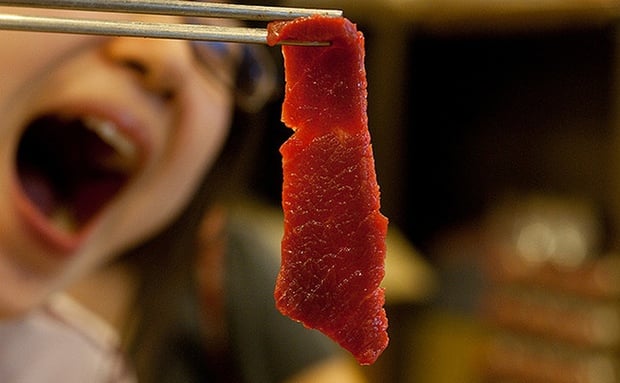Are you a pork hater? Does the smell of bacon frying in the morning make you want to gag rather than drool? You can thank
your genes for that, according to a new study.
Researchers at Duke University and in Norway have
discovered that people with two odorant receptor genes (OR7D4) tend to
be
extra-sensitive to the smell and taste of androstenone, a
steroid found in meat from male pigs. On the other hand, people
with just one of these genes can tolerate the taste and smell,
which has been described as resembling anything from urine
and sweat to vanilla.
Androstenone, a steroid that’s related to
testosterone, is found in pork from male pigs at approximately 0 to 6.4
parts per
million. This number drops significantly in castrated pigs, but
the European Union is now proposing to ban castration due
to animal welfare. Norwegian researchers wanted to test how
much consumer perception of pork containing androstenone would
affect future perceptions of meat, if the proposal were to
pass.
For the study, 23 participants were split into two groups,
based on how sensitive or insensitive they were to androstenone.
Researchers determined their sensitivity level from blood
tests. Each participant was asked to smell, cook, and sample seven
types of pork that contained varying levels of androstenone.
They then rated the flavor of the meat on a seven-point scale,
with a rating of one being “dislike very much” and seven
meaning “like very much.”
Researchers found that those who had two copies of OR7D4 ended up reporting poor ratings of meat with higher concentrations
of androstenone. “I was surprised at how cleanly this experiment showed who smelled what,” lead Duke researcher
Hiroaki Matsunami said in a statement. “The results showed that people with two copies of the functional variant of the gene for that odor
receptor thought the meat smelled worse with higher levels of androstenone added.”
The results, while preliminary, leave room to explore
how genetics may play in a role in certain cultures that have omitted
pork from their diet. Matsunami also hopes more studies can be
conducted on vegetarians, to see if their genetic predispositions
play a role in them refraining from eating meat.
This study was published in PLoS One.



















